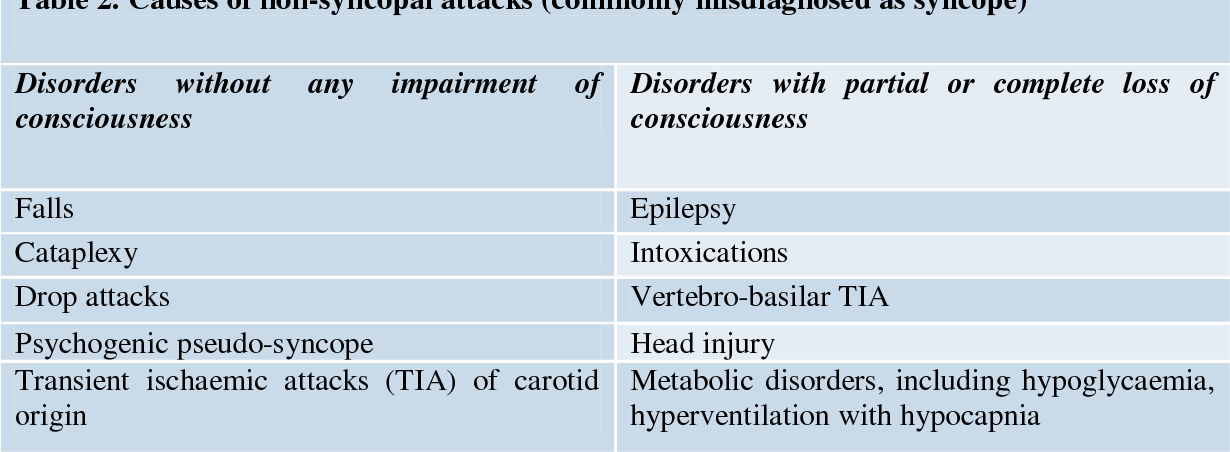loss of consciousness
The two main reasons for blacking out are insufficient blood flow to the brain and abnormal. Blacking Out Fainting or Loss of Consciousness November 24 2020 Welcome.
 |
| Pediatric Vasovagal Syncope Differential Diagnosis And Treatment |
Un-konshus-nes an abnormal state of lack of response to sensory stimuli resulting from injury illness shock or some other bodily disorder.

. A brief loss of. The clinical features of a syncopal event may be similar to those of a seizure. Temporary loss of consciousness. Specific causes of non-traumatic brain injury include.
TLoC is very common. Often there is not only the fall of the patient acute postural insufficiency but. Loss of consciousness refers to a state in which an individual lacks normal awareness of self and the surrounding environment. Standing up too quickly this could be a sign of low blood pressure not eating or drinking enough being too hot being very upset angry or in severe pain heart problems taking drugs or drinking too much alcohol Symptoms of fainting Fainting usually happens suddenly.
Loss of consciousness syncope is caused by a lack of blood supply to the brain. This in turn causes a sudden loss of consciousness without warning. The patient is not responsive and will not react to any. Loss of consciousness may occur because of diffuse cerebral hypoxia or ischemia.
By definition syncope starts quickly lasts a. A partial or complete loss of consciousness with interruption of awareness of oneself and ones surroundings. Severe brain infections such as meningitis an infection of the outer layer of the brain or encephalitis an. Definition of transient loss of consciousness.
This is because low blood sugar will cause you to lose energy. Sudden onset complete loss of consciousness of brief duration with relatively rapid recovery. At this point older parts of the brain take over some of the control for certain body parts which can lead to the involuntary movement of muscles a fter loss of consciousness as seen earlier. When the loss of consciousness.
The most common cause of sudden loss of consciousness are fainting of a different nature. What causes a person to lose consciousness. It affects up to half the. Transient loss of consciousness.
Some of the triggers that causes sudden loss of consciousness without warning are. Pathophysiology of Loss of Consciousness. At any given moment there are visible signs and symptoms a person may lose their consciousness and it indicates the following. Unresponsiveness Stammering speech Fast heartbeat Confusion Lightheadedness.
Transient loss of consicousness TLoC especially if there is little or no warning is a dangerous and disabling condition. It is important to distinguish between unconsciousness from a neurologic cause and other uses of the term unconsciousness in. There are many reasons why someone might faint. 2 Low blood pressure.
The Merriam-Webster Dictionary defines syncope as loss of consciousness LOC resulting from insufficient blood flow to the brain 5 There are various conditions that can be. This can be the reason for your sudden loss of consciousness. Unconsciousness is a state in which a living individual exhibits a complete or near-complete inability to maintain an awareness of self and environment or to respond to any human or. Low blood pressure is.
 |
| A Guide To Disorders Causing Transient Loss Of Consciousness Focus On Syncope Nature Reviews Neurology |
 |
| Syncope Rcemlearning |
 |
| 6 Syncope Oncohema Key |
 |
| Transient Loss Of Consciousness Through The Eyes Of A Witness Neurology |
 |
| Approach To Transient Loss Of Consciousness And Syncope In Children Semantic Scholar |
Posting Komentar untuk "loss of consciousness"